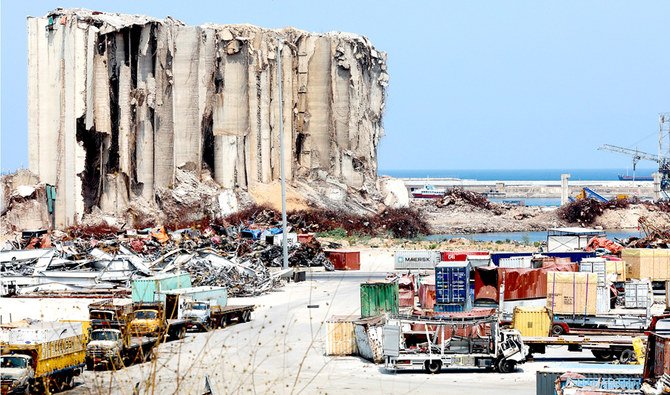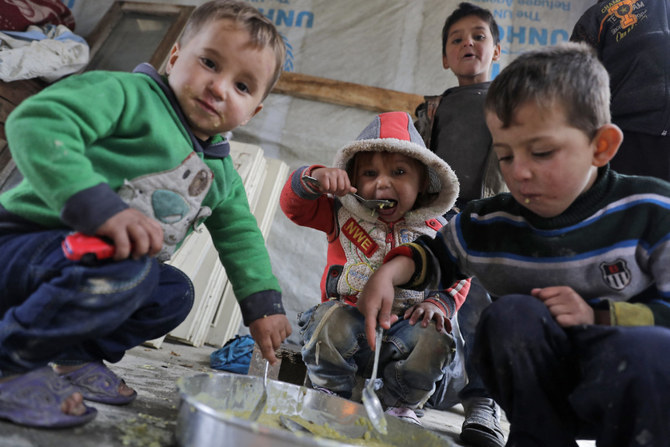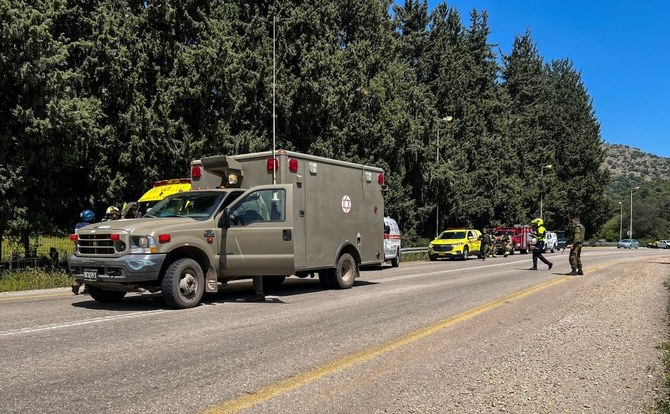BEIRUT: The people of Lebanon will on Wednesday mark the first anniversary of the devastating explosion at Beirut’s port, the country’s worst peacetime disaster.
The massive blast that destroyed a large section of the capital on Aug. 4, killed at least 214 people and injured more than 6,500. It was caused by 2,750 tons of ammonium nitrate that had been stored at the port for several years without proper safety precautions.
The families of those who died will hold a commemorative religious service at the port, business owners have said they will cover the city with black ribbons on Wednesday, and activists are planning anti-government demonstrations.
Lebanese flags were raised over balconies and shops in the city on Monday ahead of the anniversary.
A year after the tragedy, the families of the victims remain determined to ensure justice is served and those responsible for the failures that resulted in the explosion are held to account.
“Our protests will soon become fiercer,” said Ibrahim Hoteit, whose brother, Tharwat, died.
He condemned “the heinous state that did not even bother to console us,” and added: “(They) removed Judge Fadi Sawan just because he came close to (their) sectarian and political idols.
Today, this whole play is being repeated under a new title: ‘immunity’ (from prosecution).”
Sawan, who was appointed to investigate the explosion, was removed from the investigation in February after two former ministers he had accused of negligence filed a complaint. In addition, requests for immunity to be lifted from a number of top officials so that they can be questioned have not been granted.
Hoteit, who said he was speaking on behalf of the families of the victims, gave “the state 30 hours to lift immunity from the defendants, including former ministers, present lawmakers and security officials.”
He added: “The authorities are asking us to pacify the street movements on Aug. 4 — we are not the police of discipline. The people of Lebanon have the right to express their anger and rage by all available and legitimate means after you destroyed the country. Never expect us to be your mediators.”
A committee of the victims’ families announced on Monday that they reject any attempt to politicize their cause.
In a statement issued for the anniversary of the explosion, rights group Amnesty International accused the Lebanese authorities of spending “the past year shamelessly obstructing the victims’ quest for truth and justice in the aftermath of the catastrophic blast.”
Waleed Taha, 67, who was only a few hundred meters from the explosion, told Arab News: “If someone can help me on Wednesday, I will certainly take part in the mourning day with the families of the victims, the wounded and protesters.
“I feel like doing something crazy, maybe destroying something, but my mind is stopping me. Anger will not do me any good and will not heal the wounds I have been suffering from since the explosion, which broke my ribs, shoulder and knee and has left me sleepless ever since.”
Taha, who is an electrical engineer, worked in Jeddah for 10 years before returning home to Beirut in 2015 to be with his family. He loves fishing and had obtained a permit from Lebanon’s General Security that allowed him to fish at the port. He said that Aug. 4 was the first day he had gone there to fish after a COVID-19 lockdown was lifted. He was at dock 11, where the Orient Queen cruise ship was docked. At about 5 p.m., he called his wife and told her he could see a fire at dock 9, only 300 meters away. He thought the silo there contained only fireworks.
“I spoke to the other fishermen and we decided to stay because it was just fireworks,” he said.
However the sounds of explosions got louder and louder, he said.
“I was standing in front of the cruise ship and could not see what was happening,” he said. “At around 6 p.m. an explosion occurred and sent rocks flying to where I was standing. I rushed to my car. Filipino hostesses from the cruise ship’s staff were walking on the dock and one of them came to my car for protection.
“When the second, massive blast hit, the car was thrown intro the sea — but the waves, which were as high as a 10-story building, threw us back to where we were. I lost consciousness until my son came looking for me in the rubble.
“I heard his voice calling me and all I was able to do was raise my head and tell him ‘I am here.’
He called the Civil Defense, who rescued me and took me to the hospital. My son had to walk between tens of bodies and injured people who were bleeding.”
Taha said that three of his closest friends died on the dock “including two retired officers and a greengrocer fishing to provide for his family.”
He added: “On that day, more than 50 people were jogging on the port’s docks. Some of them died, some of them were injured and disabled. A friend of mine survived the blast because he had moved to dock 14 to find more fish. The Filipino girls that were near me disappeared, maybe drowned in the sea.”
Taha said he paid his own treatment and recovery expenses and that “no one cared for the injured and their fates.”
He added: “I am reliving the shock every single day; I probably need therapy, I do not know. But I lost my job as I cannot walk long distances and I am in pain.”
He is pessimistic about the chances of the truth about the explosion and those responsible being revealed, saying that the truth about the assassination of former US president John F. Kennedy would be known before who is to blame for the Beirut blast. He added that he feels hopeless about the prospects for justice in a country where the state does not care about its citizens.
“I used to pass in front of the silo that contained the ammonium nitrate every day,” Taha said.
“It was an abandoned silo with a rusty door, where some people used to urinate.
“To enter the port, one had to pass through three security checkpoints where army intelligence, the general security and the army checked the identities of those going in and the permissions they had — but the explosion still happened.”






















